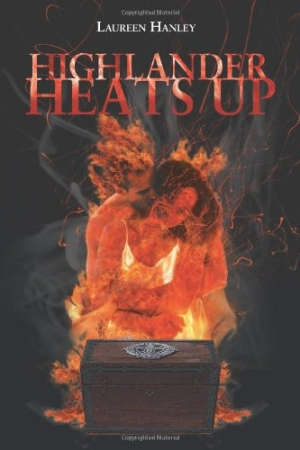Highlander Heats Up
To spice up the tried-and-true romance formula of the woman who falls for the alpha man despite initially hating him, Laureen Hanley throws time travel into the mix. Highlander Heats Up will set any romance aficionado’s heart aflame.
This sequel to Hanley’s first novel, Highlander Heat, finds the trio from book one—Monica, Lily, and Terrie—in trouble again. Terrie and Lily have disappeared from the Florida house in which the three have been held prisoner after toying with a box and talking about sixteenth-century Scotland. The captors tell Monica that they are Scottish men from 1513 who have traveled to the present using a box like the one Terrie and Lily found. To bring the two women back to the twenty-first century, Monica and the men must journey back to sixteenth-century Scotland.
Having been transported to 1513 Scotland, sharp-tongued fighter Monica finds she can’t trust her own heart. Scottish clansman Lucas wants her from the moment they meet. A skilled self-defense practitioner, Monica fights off Lucas physically and verbally when his arrogance vexes her: “‘I’m not your personal toy. Maybe your other women enjoy that, but not me. You might as well stop [kissing me] right now, because [our making love] isn’t going to happen.’ She pushed him again and slid past him.” Monica’s strength and her willingness to retaliate make her stand out in a genre known for submissive women.
While managing her relationship with Lucas, Monica befriends servants and schemes to overthrow villains. The relationship between Monica and Lucas is the focus of the story, but the relationships among the three female characters also receives attention, which is refreshing in a romance novel. While her loyalty to sweet, peaceful Lily never wavers, Monica’s relationship with promiscuous Terrie changes with alarming frequency. She calls Terrie a man-stealing slut one minute, only to shed tears of joy upon seeing her for the first time in 1513. Hanley deserves kudos for attempting to portray a common love-hate dynamic that can exist between women, but Monica and Lily’s rapport changes too often to be a believable depiction of fair-weather friends.
At first glance, Lucas seems to be the typical alpha male: romantic, possessive, passionate, rough. Yet he always apologizes for hurting the heroine, and he seems refreshingly self-aware, admitting, “I am not the kind of man who makes any promises.” When Monica and Lucas fight, they actually communicate very well as a couple, yelling about exactly what makes them jealous or angry. The nuances that give Monica and Lucas more depth than the standard-issue romantic pair also elevate the book among many in its genre.
The injection of twenty-first-century slang into the brogue of Scottish men in 1513 works because Monica’s kidnappers have traveled between the sixteenth century and the present, bringing with them some of today’s vernacular. Despite the modern argot, use of lad, lass, and clan helps keep the Scots true to their time.
This book’s inferno of passion is sure to have readers hooked as soon as they see its steamy cover showing a couple aflame in front of a mysterious chest.
Reviewed by
Jill Allen
Disclosure: This article is not an endorsement, but a review. The publisher of this book provided free copies of the book and paid a small fee to have their book reviewed by a professional reviewer. Foreword Reviews and Clarion Reviews make no guarantee that the publisher will receive a positive review. Foreword Magazine, Inc. is disclosing this in accordance with the Federal Trade Commission’s 16 CFR, Part 255.

